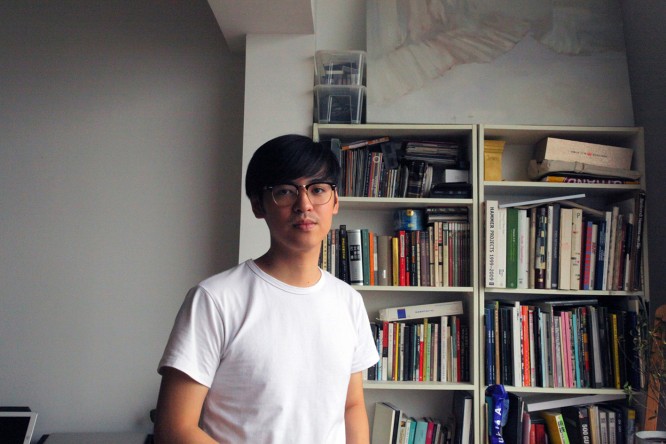Born in 1986 in Hubei province, the son of a painter, Li Ran is an artist currently focused on video and performance art. A graduate of Sichuan Fine Arts Academy, he is now based in Beijing. His work has been shown recently at AIKE Dellarco gallery (Shanghai), the Goethe Institut (Shanghai) and in Beijing at experimental gallery Magician Space.
When I was young, I thought that “artist” meant “painter,” and I came to think of myself as a painter rather than an artist. Until about three years ago, I was still painting, and gallerists keep asking me about it. I tell them that I want to, but that it doesn’t really fit my ideas at the moment. I use detailed concepts — writing and imagination are a big part of my process; I need to work out clearly what my work will be like before I try to start shooting. I write a script — it’s very important to say what I’m thinking.

李然在其北京的家中,2013年6月。
I don’t think my generation of artists have any special feeling, as if it’s different for us, or something. I think that those working in the 1990s like Ai Weiwei and Wang Xingwei faced the same issues and questions as we do. I don’t think the Chinese context has changed dramatically. Although now, there are galleries and art magazines — structures that were not there before. In my Father’s day, an artist might have one or two exhibitions in their whole life. Recently, I have always been working to a date for an exhibition. The work is then related to an exhibition, and is very “closed.” I think a lot of artists nowadays are like this.

李然,《圣维克多山》,行为艺术/视觉作品,2012
Once I was speaking to a South African artist about the systems for contemporary art in China, Africa and Asia. Afterwards, I heard him say to a curator “You know what, Chinese artists are thinking!” I thought, “Weren’t we thinking before?!” I was shocked, but now I feel that perhaps he was right. A lot of Chinese art works appear very grand, but at the level of actual knowledge, there is nothing. It’s not all about artists — knowledge production is to do with relationships. It’s very difficult to transfer knowledge, because it seems there is a disconnection between curators, writers, artists, galleries and museums. I would like for different people to work together on exhibitions, to transform knowledge. I feel that a lot of artists — good artists — of my generation are lonely. Sometimes I am, too. We can’t communicate, and in exhibitions the work sometimes looks as if it’s alone, like a person just standing there.
When people talk about Chinese art, there is one word in their minds: MARKET. They are very interested in it, asking me whether I cooperate with galleries and how much I can make in a year. I joke with them, saying “I’ll pay for this, and this. I’m a fucking Chinese artist!” In terms of the audience, when I am working I try to focus my mind rather than imagine one — it’s not real. I see a lot of art works which assume people are stupid. But you cannot know what they are thinking. A lot of people are very smart — smarter than me. Collectors, too, can be more like curators, sometimes — they are thinking! But what I do is about individual things and experiences. I do not know this nation’s experience, I just know my own. But how do I look at it, how do I think? I just do it my own way.